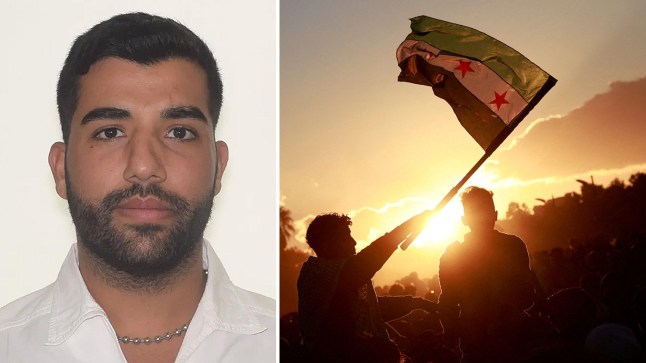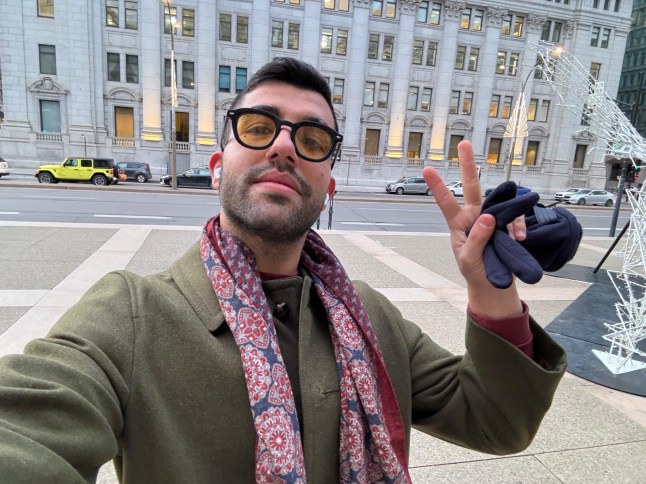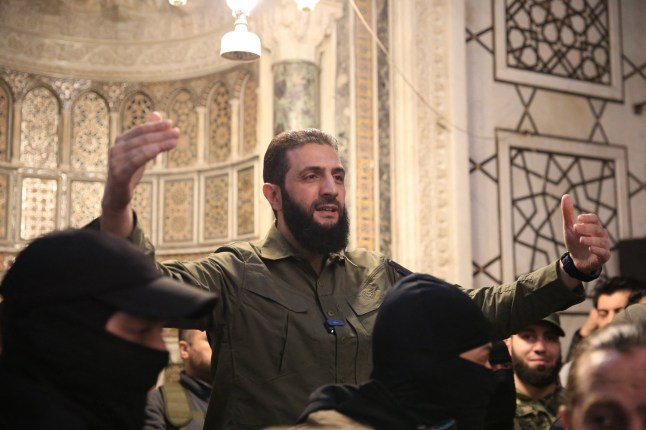
A gay Syrian man who was brutally tortured by the group that toppled Bashar al-Assad has said he and many other LGBTQ+ Syrians are still celebrating regime change in Syria – despite their fears over what the future may bring.
Francois Zankih was forced to flee Syria in 2020 after Hayʼat Tahrir al-Sham (HTS) twice kidnapped him and eventually issued a death notice against him.
Despite this, the human rights campaigner says HTS has ‘changed their behaviour’ towards minorities. He added LGBT Syrians are jubilant following the downfall of Assad, who he described as the ‘biggest source of violence’ against them.
Anti-LGBT laws and extreme homophobia across large parts of Syrian society mean, however, gay and transgender Syrians are still ‘in crisis’ and worried about the prospect of persecution if they were ever to return.
‘For me and for so many Syrians there’s no bigger risk than the Assad family,’ Francois, who is also the founder of Syria’s Firsts LGBT+ organisation Guardians of Equality Movement (GEM), said.
He told Metro: ‘Assad made the country a state of torture for LGBT+ people.


‘Of course we are worried about our future. I do not want HTS to be the government of Syria, ever.
Join Metro's LGBTQ+ community on WhatsApp
With thousands of members from all over the world, our vibrant LGBTQ+ WhatsApp channel is a hub for all the latest news and important issues that face the LGBTQ+ community.
Simply click on this link, select ‘Join Chat’ and you’re in! Don't forget to turn on notifications!
‘We do not know what’s next, but the happiness now is stronger than worry.’
Assad’s downfall came after more than 50 years of the family’s rule over Syria, when opposition forces led by HTS reached Damascus in the early hours of December 8 and Assad fled the country to Russia.
Francois was just a teenager when he was kidnapped by the precursor to HTS, the al-Qaeda affiliated Jabhat al-Nusra, in his hometown of Idlib in rebel-controlled Syria in 2016.
Who are Hayʼat Tahrir al-Sham and how radical are they?
HTS was established in 2011 under a different name, Jabhat al-Nusra, and was a direct affiliate of al-Qaeda.
Jabhat al-Nusra, led by Abu Mohammad al-Jolani and labelled a terrorist organisation by the UK, US and others, quickly became an effective fighting and governing force in Syria.
In late July 2016, al-Jolani announced the dissolution of the group and cut ‘external ties’ with al-Qaeda, forming HTS in January 2017.
Since then, there have been public rifts between HTS and al-Qaeda. Al-Qaeda’s leadership has criticised the Syrian group and HTS arrested al-Qaeda members in their territories.
Today, HTS maintains that it is ‘an independent entity that follows no organisation or party, al-Qaeda or others.’
The UK government still labels HTS a terrorist organisation, and says that the group ‘should be treated as [an] alternative’ name for al-Qaeda.
Al-Julani wants HTS to be seen as a credible governing entity in Syria and a possible partner in global counterterrorism efforts.
According to experts, HTS has shifted their focus away from global jihad in recent years and moderated their rule to consolidate power. Minority groups in Idlib province, such as Druze, Kurds and even Christians have enjoyed some protection.
However, efforts by HTS towards legitimacy have also been tarnished by alleged human rights abuses and the group has violently quelled protests in the past.
Punished for his activism and article writing on LGBT and gender rights, Francois was subjected to stoning and sexual torture by the opposition group, who controlled parts of north west Syria at the time.
Not long after this ordeal, the group’s leader Abu Mohammed al-Jolani, publicly broke ranks with al-Qaeda and formed HTS.
In 2018, Francois was kidnapped and abused again by rebel groups including HTS.
He said on one occasion, the rebel soldiers held a large stone of his head and let it fall on his face – breaking his skull and leaving him hospitalised.
It was in February 2020, as Francois’ sought to establish GEM, that HTS issued a ‘death penalty and hunting warning’ against him.
He fled in the middle of the night, crossed the border into Syria and walked on foot for four days to secure his freedom.
Despite all of this, the human rights campaigner believes that HTS ‘have changed their behaviour since back then’ as the group sought to legitimise their rule in north western Syria.
The expert on Syrian geopolitics said: ‘They have changed their behaviour by protecting minorities such as Christians.

‘They want it to be more open. They want to build a relationship with the international community.
‘HTS have not been targeting activists.’
The rebel group even sent Francois, who now lives in Montreal, a message saying they do not have a problem with his activities anymore, although he said he feels he cannot fully trust them.
‘When we remove the biggest source of violence, which is the dictatorial, criminal Assad regime, we are minimising violence against the LGBTQ+ community,’ said Francois.
‘Many LGBT Syrians will go back.’
As many as 260,000 LGBTQ+ Syrians fled abroad to escape violent persecution under Assad’s dictatorship, as ‘unnatural’ same-sex activity for both men and women was banned under the 1949 penal code.
LGBTQ+ Rights in Syria under Assad
Same-sex sexual activity is banned under the Penal Code 1949, which criminalises acts of ‘unnatural sexual intercourse’.
Both men and women face a maximum penalty of three years’ imprisonment under this Code.
According to the Human Dignity Trust, information on prosecutions of LGBTQ+ people in Syria is hard to come by, but there is evidence of the law being enforced in recent years.
Arrests against LGBTQ+ people, on the basis they are violating ‘public decency’, usually take place without warrants and detainees face verbal, physical and sexual violence.
There are also reports that Syrian security services use fake accounts on Grindr to prosecute LGBTQ+ people.
Outside of legal enforcement, the a US Department of State report noted that the regime incited, perpetrated, and condoned violence against LGBTQ+ persons.
The regime and other armed groups in Syria have subject members of the LGBTQ+ community to humiliation, torture, and abuse in detention centres.
HTS toppled Assad less than two weeks after the rebels launched renewed attacks on Syrian forces in western Aleppo in November.
The group have now established a transitional government, led by Prime Minister Mohammed al-Bashir, and claim they will run it until March 2025.
But some geopolitical experts have expressed concern that HTS will want to rule all of Syria with an iron fist. They note that the group has not put forward a detailed roadmap to forming a broader coalition for governing the country.
Assaad Al Achi, executive director of Baytna, a non-governmental organisation that supported local civil society groups in Syria throughout the war, told Al Jazeera: ‘What worries me is if [this caretaker government] extends [its term] for more than three months, but if it just for three months … then that’s alright.’
Robin Yassin-Kassab, an expert on Syria and the co-author of Burning Country: Syrians in Revolution and in War, added: ‘[HTS] need to say this is the beginning of a process that will involve every aspect of society and all political leaderships.
‘That would reassure Syrians and the international community and give the new government much more legitimacy.’
HTS has a history of violent homophobia. A report of the UN Human Rights Commission in 2021 HTS-created ‘unauthorised courts’ issuing death sentences against ‘women and sexual minorities, including men accused of homosexuality.’
In contrast to the persecution faced by many under Assad and rebel groups in recent years, Francois has now heard stories of LGBTQ+ Syrians returning safely to HTS-controlled territory.
One of GEM’s board members, who is a transgender man, is now living in Damascas.
GEM has also heard the story of a gay man who was deported back into Syria from Turkey five months ago, and was only sent to prison for two weeks by HTS to memorise Quran versus.

This punishment was lighter compared to previous years, but the group remains cautious over the new leaders of Syria.
‘There is a behaviour change, but maybe tomorrow someone will be killed by HTS because he is gay. I do not know,’ Francois said.
‘We cannot trust them enough because their behaviour was bad. It is too early to judge.’
Uncertainty remains as to whether HTS change of approach reflects a genuine ideological shift or a calculated strategy aimed at winning approval and consolidating power.
Islamist hardliners, who have are influential clerics and commentaros, have continued to hold sway over Syrian politics in the days that followed the fall of Assad.
Last week, HTS’s leader al-Jolani faced criticism for taking a photo with a women who they considered a immodestly dressed.
The biggest roadblock to safety for LGBTQ+ Syrians is fervent homophobia in Syrian society, warns Francois.
He said: ‘The regime worked systematically to make the people conservative, racist and homophobic.
‘The community are extremely homophobic.
‘If the authorities do not target LGBTQ+ people, the society will.’
As an example Francois cites the story of a transgender women, who was also deported back into Syria from Turkey five months ago, and was killed by her family upon her return.
Because of these attitudes, Francois recognises that it would be politically impossible for HTS to repeal harsh homophobic laws, and he is even worried about the prospect of further criminalisation of sexual and gender minorities.
‘HTS are busy controlling the entire country, they are not paying attention to the LGBTQ+ community.
‘There is now a gap of security and governance and so LGBTQ+ people are at a higher risk.
‘They’ll be targeted more, if not from authorities, but from the community.’

But Francois is optimistic that progress can be made in changing societal attitudes now that Assad is gone, and believes that Syrian community life can be safe for LGBTQ+ people.
He said: ‘In Syria, we have a social forgiveness.
‘Even if Syria is not the richest country, but we have a rich social commitment.
‘This social commitment means that thousands and millions of people and survivors will forgive.
‘We now have common ground we can work on.’
Francois has even forgiven his own torturers, many of whom were only teenagers themselves.
Francois’ organsation Guardians of Equality Movement are working to foster a new atmosphere of reconciliation and peace towards LGBTQ+ people.
More Trending
They are currently working to initiate a Universal Periodic Review (UPR) by the United Nations Human Rights Council, a mechanism that will mean Syria’s human rights record on LGBTQ+ issues can be examined.
‘Syria has never received a recommendation regarding LGBTQ+ right by the UPR because we didn’t have organised activism.’
‘We want to put the government in the corner.
‘We have a lot of rebuild and recovery and it should start with the community.’
Get in touch with our news team by emailing us at webnews@metro.co.uk.
For more stories like this, check our news page.
MORE: RuPaul ‘seriously considering’ quitting Drag Race UK after The Vivienne’s death
MORE: UK’s secret LGBT island community that wasn’t known about for decades
MORE: Dozens of LGBTQ+ erotica writers arrested in Chinese national crackdown













